The world is moving towards renewable energy, and solar panels are in high demand. In 2024, people have many choices for efficient solar panels. These panels use the latest technology and can change how we power our homes and businesses.
Brands like SunPower, REC Group, Panasonic, Maxeon Solar Technologies, and Jinko Solar lead the solar revolution. They make solar panels that catch the sun’s energy well. These panels also last long and work well over time.
The Maxeon 7 is the most efficient solar panel for homes, with a 24.9% efficiency in labs. It’s expected to be available in the US in 2025. This shows how fast solar technology is improving.
Jinko Solar’s Tiger Neo 3.0 panels are also very efficient, at 24.8%. Longi Green Energy and Trina Solar have even higher efficiencies, at 25.4% and 25.9% respectively.
These high efficiencies mean we’re getting closer to using renewable energy easily and effectively. This lets homeowners and businesses switch to clean energy with confidence.
Key Takeaways
- The most efficient residential solar panel is the Maxeon 7, with a lab efficiency of 24.9% and real-world efficiency of 24.1%.
- Jinko Solar’s Tiger Neo 3.0 panels have reached an efficiency of 24.8%, showcasing the rapid advancements in solar technology.
- Industry leaders like Longi Green Energy and Trina Solar have set new world records for solar panel efficiency, with conversion rates of 25.4% and 25.9% respectively.
- The availability of high-efficiency solar panels is driving the adoption of renewable energy, making it an increasingly accessible and viable option for homeowners and businesses.
- Factors like panel type, power output, efficiency, temperature performance, warranty coverage, and cost-effectiveness are crucial in evaluating the best solar panels for residential use.
Understanding Solar Panel Technology in 2024
The world is moving towards cleaner energy, and solar panel tech has evolved a lot. In 2024, you can choose from many solar panel types, each with special features. Knowing about these options and the latest tech is key to choosing the right clean energy solution.
Types of Solar Panels Available Today
In 2024, you can pick from monocrystalline panels, polycrystalline panels, and thin-film panels. Monocrystalline panels are top for homes because they’re efficient and small. Polycrystalline panels are cheaper but less efficient. Thin-film panels are best for big projects where cost matters most.
How Solar Panels Generate Clean Energy
Solar panels use photovoltaic technology to turn sunlight into electricity. This lets people make their own clean energy. The solar cell efficiency is important for how well a panel works.
Latest Technological Advancements
The solar field has seen big leaps in tech, making panels better and cheaper. New tech like TOPCon modules and hybrid passivated back contact technology boost efficiency. These advancements help solar panels work better and cost less.
As tech keeps improving, solar panels will get even better and cheaper. This makes switching to clean energy easier and more attractive for everyone.
Maxeon 7: The New Industry Leader
If you’re looking for top-notch solar panels, the Maxeon 7 is a must-know. It has broken records with an efficiency of 24.9% in labs and 24.1% in real use. This performance is a big deal for the US solar market.
Maxeon Solar Technologies, a company listed on NASDAQ, is leading the way. They’re focusing on the US market and building a local solar panel supply chain. This plan aims to boost growth and profits through local manufacturing.
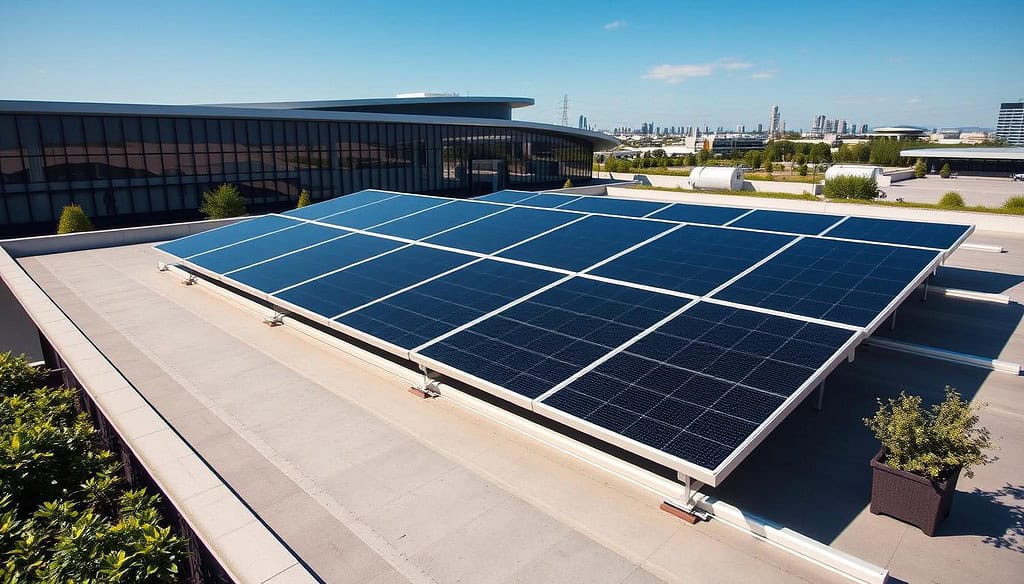
The Maxeon 7 panels use the company’s unique TOPCon cell technology in a shingled design. They offer top performance and reliability. Plus, they come with a 40-year warranty, showing Maxeon’s confidence in their products’ quality.
Sustainability is key for Maxeon. Their Performance 7 panels are Cradle to Cradle Certified. This means they meet high environmental and social standards from start to finish. It shows Maxeon’s dedication to eco-friendly manufacturing and a sustainable future.
Maxeon has over 1,650 patents in solar energy and a global network of over 1,700 partners and distributors. They’re ready to lead innovation and growth in the US solar market. As the Maxeon 7 hits the market soon, people will get to experience the future of solar power.
Key Factors in Solar Panel Selection
Choosing the right solar panels is key for your home or business. You need to think about how well they work, how much power they make, and how they’ll perform over time. Knowing these things helps you choose wisely and get the most from your solar investment.
Efficiency Ratings Explained
Solar panel efficiency shows how well a panel turns sunlight into electricity. Panels with higher efficiency ratings make more electricity from the same sunlight. For example, bifacial panels, which catch sunlight on both sides, can produce more energy than regular panels.
Power Output Considerations
Power output tells you how much electricity a panel can make under certain conditions. This is important for figuring out how much energy your solar system will produce. Things like panel size, cell type, and weather can change power output. So, it’s important to look at the details of each panel option.
Temperature Coefficient Impact
The temperature coefficient shows how a panel’s power drops as it gets hotter. Panels with a lower coefficient are better for warm places because they lose less power in the heat. This is especially important in hot climates or during long warm periods.
“Solar panels are typically warrantied to last 25 years, with an efficiency guarantee of 84% to 92% after year 25.
By looking at efficiency, power output, and temperature coefficient, you can choose the best solar panels for your needs. This ensures your solar investment works well and lasts a long time.
Top Performing Solar Panels Best for Residential Use
Choosing the right solar panels for your home is key. You need to think about efficiency, power output, and how they perform in different weather. The latest data shows some top brands are the best for homeowners wanting the best solar solutions.
The SunPower M-Series panels lead with an efficiency of 21.2 watts per square foot. They are very efficient and built to last, making them great for those who want to make the most of their solar energy.
The REC Alpha Pure-R series is another top pick, with an efficiency of 20.7 watts per square foot. These panels perform well, even in tough weather, making them a solid choice for homes.
The Panasonic EverVolt series is also worth considering, with an efficiency of 20.6 watts per square foot. They are known for their design and flexibility, perfect for homes with limited roof space.
Maxeon 3 BLK-R panels are a top choice too, with an efficiency of 20.6 watts per square foot. Maxeon is a leader in innovation and reliability, making them a great option for homes.
The Jinko Solar Tiger Neo series rounds out the list, with impressive efficiency and power output. They are a cost-effective choice for homeowners looking for high-performance solar solutions.
In the end, the best solar panels for your home depend on your needs, budget, and preferences. But these top brands from SunPower, REC, Panasonic, Maxeon, and Jinko Solar are sure to offer clean, reliable energy for your home.
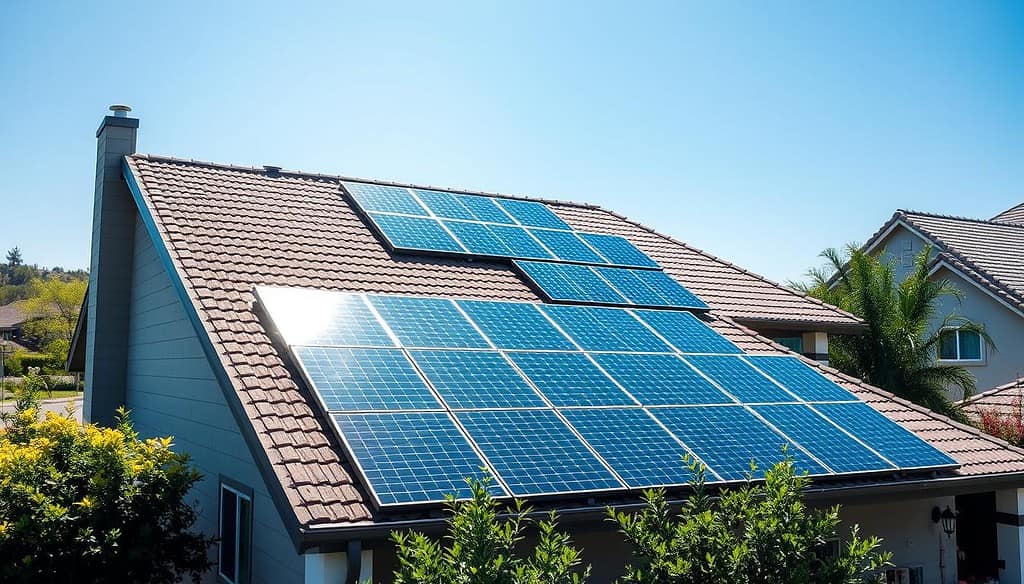
SunPower M-Series: Premium Performance Analysis
The SunPower M-Series is a top choice for high-efficiency solar panels. These panels have an impressive 21.2 watts per square foot. This makes them the highest power output among top solar panel makers.
With an efficiency rating of 20.8%, the SunPower M-Series offers unmatched performance. They are perfect for homeowners with small roof spaces or lots of shading.
Efficiency Specifications
The SunPower M-Series 440 W panels lead in solar technology with their high efficiency. They outperform the top 20 US solar panel makers with a 21.2% efficiency rating. This means more energy from a smaller roof area, making them a smart choice.
Warranty Coverage Details
Homeowners can feel secure with SunPower’s warranty. The M-Series panels, along with inverters and racking, have a 25-year warranty. This ensures long-term protection and peace of mind.
SunPower also offers a 10-year warranty for their monitoring hardware. This shows their commitment to keeping their solar systems performing well.
Cost-Benefit Analysis
The SunPower M-Series comes with a higher price. A 5 kW system can cost between $13,250 and $21,000, or $2.65 to $4.20 per watt. This is a big investment.
However, the long-term energy savings and superior performance make it worth it. Especially for those with small roof spaces or shading issues. The M-Series’ efficiency and power output can justify the higher cost.
| Specification | SunPower M-Series |
|---|---|
| Power Rating | 440 – 420 watts |
| Efficiency | 20.8% |
| Warranty | 25-year product warranty, 10-year monitoring hardware warranty |
| Cost per Watt | $2.65 – $4.20 |
“SunPower’s technology provides better performance and top-quality installations, leading to increased energy production efficiency.”
REC Alpha Pure-R: Excellence in Temperature Performance
The REC Alpha Pure-R series excels in hot climates. It has a temperature coefficient of -0.24%/°C. This means it works well even when it’s very hot.
These panels have a 22.3% efficiency rating and produce 430 watts. They look sleek with their all-black design. This makes them a great choice for homes.
The REC Alpha Pure-R stands out because of its temperature performance. It loses only 0.24% efficiency for every degree Celsius above 25°C. This is better than many other panels. It’s perfect for sunny areas, helping homeowners get more solar energy all year.
These panels cost about $2.68 per watt. They come with a 25-year warranty and a 92% performance guarantee. This shows they are durable and reliable.
Key Features of the REC Alpha Pure-R:
- 22.3% efficiency rating
- 430W power output
- -0.24%/°C temperature coefficient
- All-black aesthetic for a sleek, modern look
- 25-year product and 92% performance warranty
- Average cost of $2.68 per watt
If you need solar panels for a hot climate, the REC Alpha Pure-R is a great option. It has excellent temperature performance, high efficiency, and a reliable warranty. It’s a top choice for homes in warm areas.
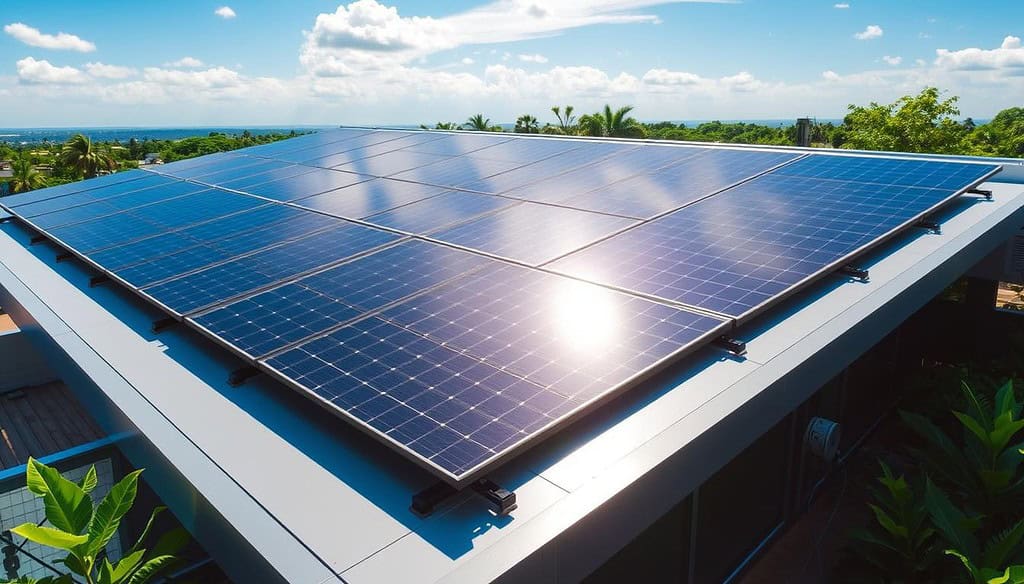
Panasonic EverVolt: Compact Solution for Limited Spaces
When choosing solar energy for your home, size and flexibility are key. This is especially true if your roof is small or oddly shaped. The Panasonic EverVolt solar panels are a compact, versatile option that fits well in any space.
Size and Design Features
The Panasonic EverVolt panels are the smallest available, measuring 19.9 square feet. They have a 22.2% efficiency rating and produce 410 watts of power. This makes them perfect for homes with little roof space or unusual roof shapes.
Installation Flexibility
The EverVolt’s small size and light weight make it easy to install. These Panasonic solar panels can be set up on tricky roofs or in tight spots. This lets you use every bit of your roof to make more clean energy with your small roof solar solutions.
Even in hot weather, the EverVolt panels keep performing well, thanks to a low temperature coefficient of 0.26%/°C. Panasonic also offers a 25-year warranty and a 92% performance guarantee at the end of that time. This gives you confidence and value for years to come.
The average cost of a Panasonic EverVolt system is $2.93 per watt. This makes it a good deal for homeowners looking for a compact solar panel solution. Even though Panasonic doesn’t make these panels themselves, they ensure quality and honor their warranty, giving you great value for your money.
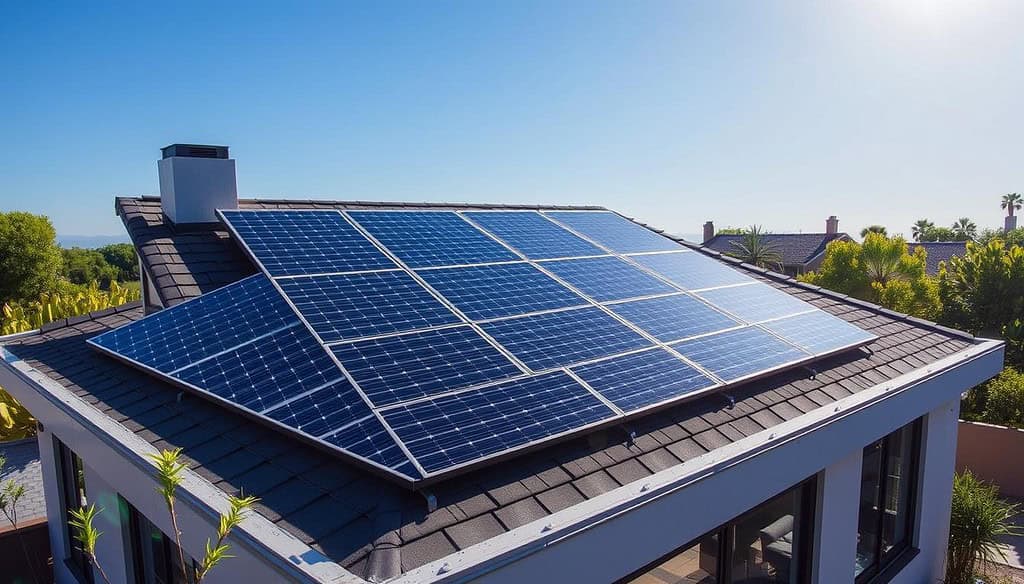
The Panasonic EverVolt is a top pick for homeowners with small or unique roofs. Its small size, high efficiency, and easy installation make it a great Panasonic solar panels option for your small roof solar solutions.
Maxeon Solar Technologies: Industry-Leading Warranty
Maxeon solar panels lead the way in solar panel longevity and performance. They offer an industry-leading 40-year warranty. This warranty ensures 88.25% of the original power output after 40 years. It’s 15 years longer than the usual warranty.
Maxeon panels also have a high 20.2% efficiency rating for their Maxeon 3 BLK-R 420W model. Their 0.27%/°C temperature coefficient means they perform well in tough climates.
Maxeon panels might cost more upfront, about $3.35 per watt. But, their long-term value is unmatched. They are about 9% less expensive than SunPower’s M-Series and offer similar performance and warranties.
“Maxeon solar panels are the gold standard in the industry, offering unbeatable longevity and peace of mind for homeowners.”
Maxeon solar panels focus on quality, durability, and long-term solar warranty coverage. Their commitment to solar panel longevity makes them the industry leader. This gives customers confidence in their sustainable energy investment.
Jinko Solar: Best Value Proposition
If you’re searching for affordable solar panels with great performance, Jinko Solar is a top choice. Their panels have over 22% efficiency and cost about $2.82 per watt. This makes Jinko Solar a leading cost-effective solar option.
Jinko Solar recently introduced the Tiger Neo 3.0 module with 24.8% efficiency. This makes it a standout high-value solar panels choice. They offer residential panels in 495W and utility versions in 670W, meeting various power needs. Their panels use advanced TOPCon technology for top-notch performance, even in tough climates.
While Jinko Solar’s panels might not be ideal for smaller roofs, their quality and innovation are clear. They have a big presence globally and a strong network in the U.S. This makes Jinko Solar a reliable name in solar.
“Jinko Solar is equivalent to powering approximately 4,900,000 U.S. households in 2024, and 1 out of every 10 solar modules in the world is produced by the company.”
Looking to save on energy or want a high-value solar panels option? Jinko Solar is a great choice. Their mix of affordability, performance, and reliability puts them at the forefront of the solar market.
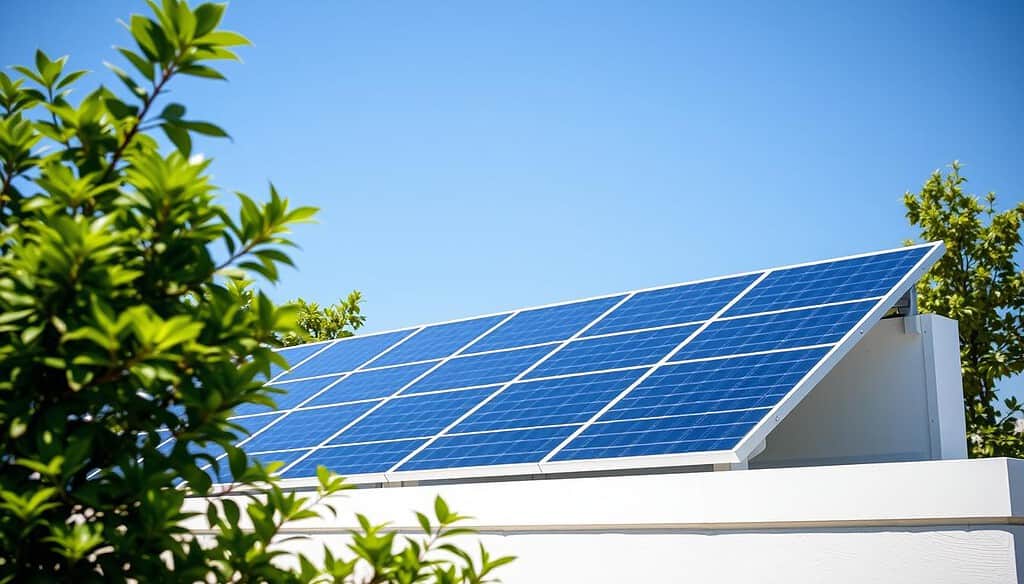
Temperature Performance and Climate Considerations
Temperature is key when it comes to solar panel performance. The temperature coefficient shows how a panel’s efficiency changes with temperature. Panels with lower coefficients are better in hot weather.
The REC Alpha Pure-R solar panels are top-notch, with a temperature coefficient of 0.24%/°C. This means they stay efficient even in very hot conditions. The Panasonic EverVolt is close behind, with a coefficient of 0.26%/°C. These panels are great for places with lots of heat, ensuring they work well all year.
| Solar Panel Model | Temperature Coefficient |
|---|---|
| REC Alpha Pure-R | 0.24%/°C |
| Panasonic EverVolt | 0.26%/°C |
Choosing the right solar panels depends on your local climate. High-efficiency panels are important, but so is their ability to work well in heat. If you live in a hot area, pick panels that resist heat well. This ensures you get the most energy and save money over time.
Knowing how different solar panels perform in heat helps you make smart choices. This way, you can get solar panels that meet your clean energy needs, no matter the climate.
Warranty Comparison and Long-Term Value
When you invest in solar panels, the warranty and how long they last are key. Solar panel warranties differ a lot. Top makers offer various protections for both the materials and how much power they make.
Maxeon Solar Technologies leads with a 40-year warranty and an 88.25% power guarantee at the end. Most top brands offer 25-year warranties with 90-92% performance guarantees.
SunPower is known for its top-notch solar solutions. It offers a system-wide warranty. This covers the panels, inverters, and labor costs. This can give you more peace of mind for your long-term solar investment.
ZNShine Solar also stands out with a 30-year warranty. It shows its dedication to making products that last. When looking at solar panels, it’s important to check the warranty and how much they degrade. This helps you see the long-term value and return on your investment.
| Solar Panel Brand | Warranty Length | Power Output Guarantee |
|---|---|---|
| Maxeon | 40 years | 88.25% at year 40 |
| SunPower | 25 years | 92% at year 25 |
| ZNShine Solar | 30 years | 90% at year 30 |
| Jinko Solar | 25 years | 91% at year 25 |
| Panasonic | 25 years | 92% at year 25 |
By looking at solar panel warranties, long-term solar investment, and solar panel degradation rates, you can choose wisely. This ensures the best value and performance for your solar system over time.
Manufacturing Quality and Brand Reliability
The quality of solar panels and the brand’s reputation are key. Top brands like SunPower, REC, Panasonic, Maxeon, and Jinko Solar lead the industry. They are known for quality and innovation.
SunPower and Maxeon are well-known in the home solar market. They make high-efficiency panels that last. Panasonic, with its electronics background, is also a strong player. It’s known for its strict quality checks.
Brands like Silfab and Qcells have set up U.S. factories. This local production boosts quality and support for customers.
| Solar Panel Manufacturer | Quality Control Measures | Manufacturing Facility Location |
|---|---|---|
| SunPower | Rigorous testing, advanced manufacturing processes | Philippines, Malaysia |
| Maxeon | Comprehensive quality assurance, industry-leading warranties | Malaysia, Mexico |
| Panasonic | Strict quality control, leveraging electronics expertise | Japan, Malaysia |
| Silfab | Advanced manufacturing techniques, U.S.-based facilities | Washington, USA |
| Qcells | Rigorous testing, U.S. manufacturing footprint | Georgia, USA |
When choosing solar panels, look at the brand’s history and quality. This ensures a reliable, lasting clean energy solution.
“Solar panel quality and brand reputation are paramount considerations when transitioning to clean energy. Investing in a reliable, high-performing solar solution can provide peace of mind and long-term energy savings.”
Conclusion
In 2024, many top solar panels have come to the forefront. Maxeon 7, SunPower M-Series, REC Alpha Pure-R, Panasonic EverVolt, and Jinko Solar Tiger Neo stand out. Each offers unique benefits for different needs and preferences.
When picking the right solar panels, look at their efficiency, power output, and how they handle heat. Also, consider the warranty and cost. Maxeon and SunPower panels are top for energy production. REC and Panasonic panels are great for hot climates. Jinko Solar offers a good mix of quality and price.
The best solar panels for you depend on your needs, roof space, climate, and budget. High-efficiency panels have many benefits. But, experts say the whole system design and professional installation are key for the best results. By carefully considering these factors, you can choose the best solar panels for your energy needs in 2024 and beyond.
